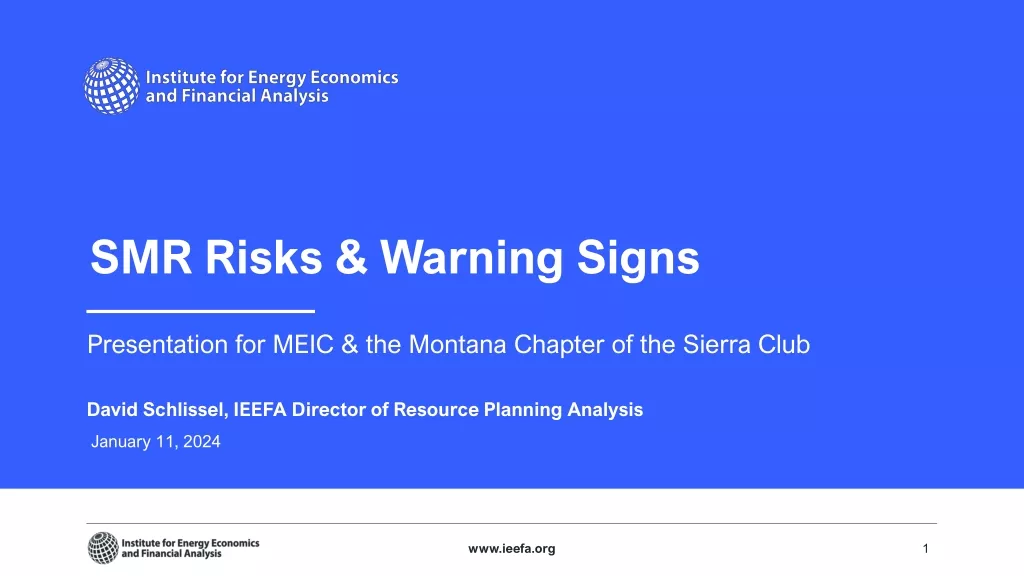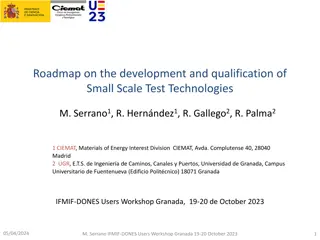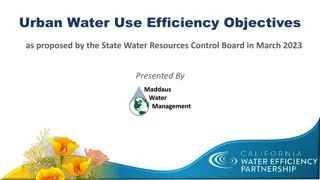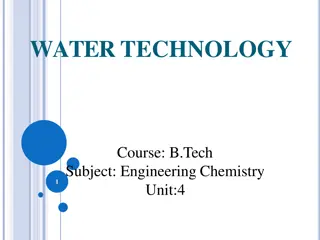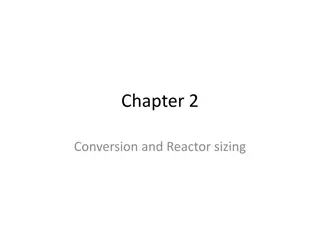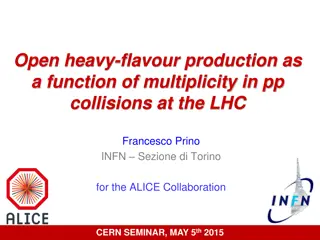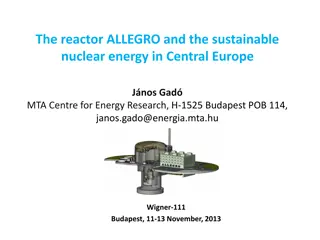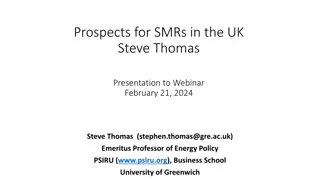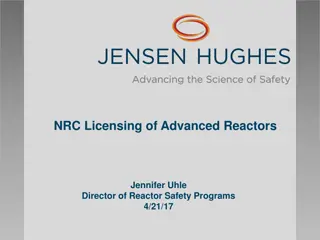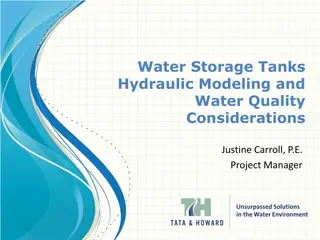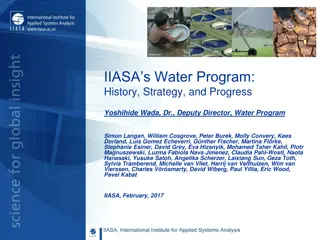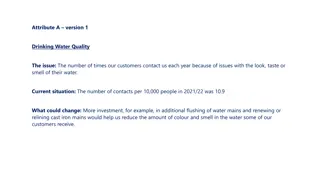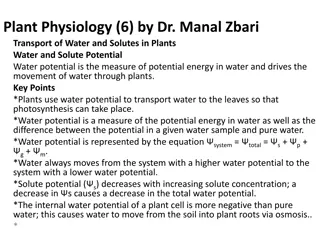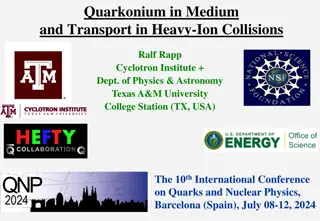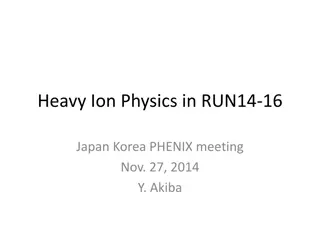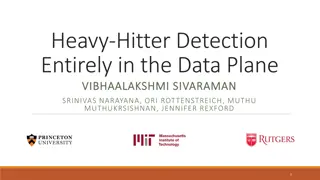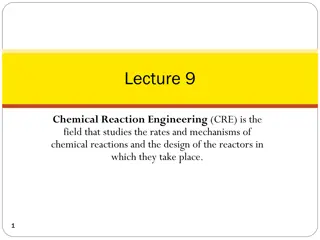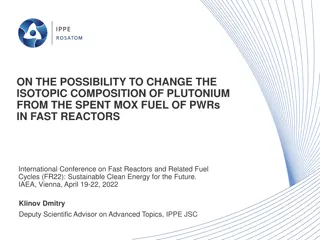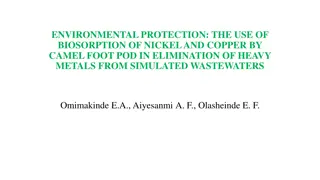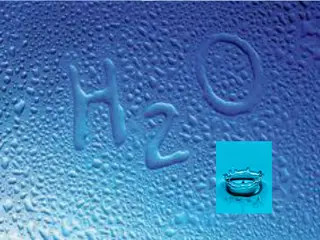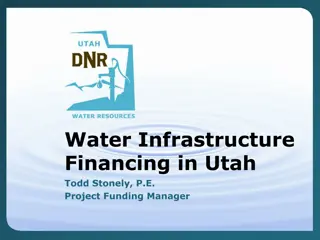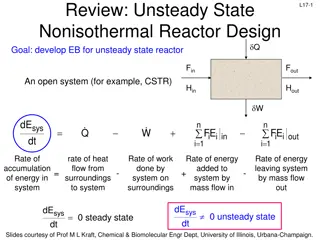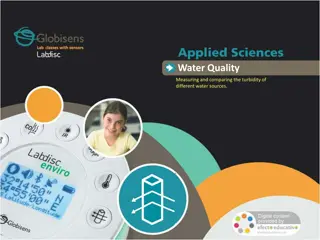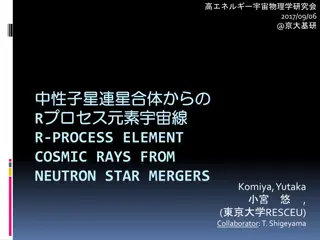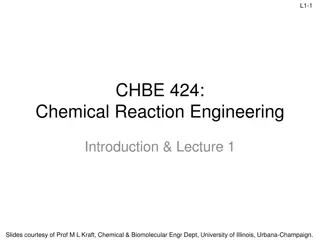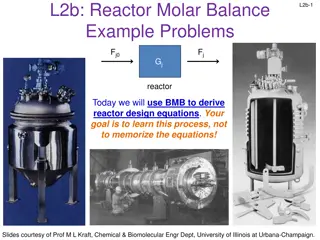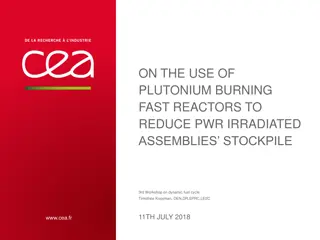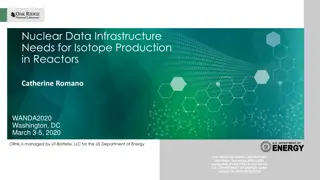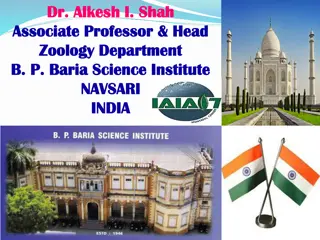Alkaline Water Ionizer Machine In India | Best Alkaline water Machine
\n \nAre you fed up with consuming bland tap water that fails to deliver the health benefits you crave? Ionia presents a solution to revolutionize your water-drinking experience with our alkaline water ionizer machine. Our cutting-edge device converts regular tap water into premium-quality, antioxid
4 views • 5 slides
Water Ionizer India | Best Water Ionizer Machine
Water Ionizer India\n\nAre you worried about the purity of your drinking water? Look no further than Ionia, the premier provider of water ionizers in India. Our state-of-the-art technology converts ordinary tap water into pristine, alkaline, and antioxidant-rich water, ensuring optimal health and vi
2 views • 5 slides
Risks and Warning Signs of Small Modular Reactors (SMRs)
Small Modular Reactors (SMRs) are nuclear reactors with a power capacity of 300 megawatts or smaller. Despite potential benefits, there are significant risks associated with SMRs, including cost overruns, schedule delays, lack of construction, and high power prices. The industry's track record raise
4 views • 22 slides
Development and Qualification of Small Scale Test Technologies in Structural Engineering
Small Scale Test Technologies (SSTT) play a crucial role in determining the mechanical properties of materials used in engineering applications. This roadmap focuses on the importance of testing relevant volumes to ensure transferability to real-world structures. It discusses the need for consistent
0 views • 26 slides
Understanding Water Management: Principles, Practices, and Soil-Water Relations
Explore the principles and practices of water management in agriculture with a focus on water availability, nutrient relationships, and losses. Discover the physical classification of water, available water defined between field capacity and wilting point, soil water potential, and the soil-plant-at
6 views • 17 slides
Aspen Simulation of Steam Reforming and Haber-Bosch Processes in Kinetics Reactors
Aspen simulation showcases the kinetics reactors for steam reforming of natural gas and the Haber-Bosch process for ammonia production. Steam reforming is highly endothermic, producing hydrogen and CO, while the Haber-Bosch process is exothermic, crucial for ammonia synthesis. The RPlug reactor and
4 views • 26 slides
Water Filtration & Bottles Stay Refreshed Anywhere, Water Filtration & Bottles
Stay Refreshed Anywhere, Water Filtration & Bottles\nSurvival Supplies Australia understands the importance of staying hydrated outdoors. When you're on the move, having a clean and fresh supply of drinking water is essential. Our range, including water filter bottles and portable water filters, ens
3 views • 1 slides
State Water Resources Control Board's Urban Water Use Efficiency Objectives
The State Water Resources Control Board proposed Urban Water Use Efficiency Objectives in March 2023 to address the challenges of a hotter, drier future. The objectives include creating storage space for up to 4 million acre-feet of water, recycling and reusing at least 800,000 acre-feet of water pe
0 views • 32 slides
Investigating Be Dust Generation for Fusion Reactors
Investigate the properties of beryllium (Be) dust particles generated using milling techniques for fusion reactors. The study involves analyzing particle size, morphology, crystal orientation, and thermal behavior of Be dust in air and water environments. Laboratory experiments will be conducted to
2 views • 5 slides
Understanding Water Hardness and Impurities in Water Technology
Water technology in the field of Engineering Chemistry explores sources of water, major impurities, hardness of water, and distinctions between hard and soft water. The content delves into the impact of mineral concentrations on soap lathering, categorizes hardness into temporary and permanent forms
1 views • 72 slides
Update on Informal Working Group Activities for AEBS in Heavy-Duty Vehicles
The Informal Working Group on AEBS for Heavy-Duty Vehicles has made significant progress in developing a draft regulatory proposal to revise UN Regulation No. 131. Key tasks include assessing accident situations, exploring a generic marker triggering AEBS, defining performance requirements, and more
8 views • 9 slides
Reactor Sizing and Conversion in Chemical Engineering
This chapter explores the sizing of Continuous Stirred Tank Reactors (CSTR) and Plug Flow Reactors (PFR) using conversion values and overall conversion. It covers the definition of conversion, batch reactor design equations, design equations for flow reactors, and more. The content delves into the m
0 views • 17 slides
Open Heavy-Flavour Production in pp Collisions at the LHC - Physics Seminar Overview
Physics seminar presentation by Francesco Prino on open heavy-flavour production as a function of multiplicity in pp collisions at the Large Hadron Collider (LHC). The talk covers the motivation behind studying heavy-flavour production mechanisms, data analysis techniques, results on the multiplicit
0 views • 65 slides
The Global Water Crisis and Transboundary Issues in Southern Africa
The global water crisis is a pressing issue affecting millions worldwide, with about 700 million people currently living below the water-stress threshold. By 2025, this number is projected to reach 3 billion. The increasing pressure on shared water resources in countries like Botswana, Namibia, and
0 views • 52 slides
Advancing Sustainable Nuclear Energy in Central Europe with Fast Reactors
Explore the potential of G4 fast reactors for advancing sustainable nuclear energy in Central Europe. Learn how fast neutron spectrum reactors can help address uranium stock depletion, waste elimination, and fuel cycle closure. Discover the regional long-term solution proposed for V4 countries and t
0 views • 12 slides
Insights on Small Modular Reactors (SMRs) in the UK
Steve Thomas presents an overview of Small Modular Reactors (SMRs), highlighting the challenges and misconceptions surrounding their development and commercial availability. The discussion covers various claims about SMRs, their categorization, and the current status of Advanced Modular Reactors (AM
0 views • 17 slides
NRC Licensing of Advanced Reactors and NuScale Small Modular Reactor Design Overview
Overview of NRC licensing process for advanced reactors, including a focus on Small Modular Reactors under 10 CFR Parts 50 and 52. Details on licensing options, such as Conceptual Design Assessment and Prototype Plants, are discussed. NuScale's Small Modular Reactor design, featuring passive safety
4 views • 12 slides
Forms of Precipitation and How They Form
Precipitation is any form of water that falls to earth and occurs when water evaporates into the atmosphere, saturates it, then condenses back into water. There are 5 main types of precipitation: rain, sleet, hail, snow, and freezing rain. Rain forms as water droplets in clouds collide and grow too
1 views • 14 slides
Water Storage Tanks Hydraulic Modeling and Water Quality Considerations
This presentation by Justine Carroll, P.E., Project Manager, focuses on the hydraulic modeling and water quality considerations related to water storage tanks. It covers topics such as water age evaluation, steady state modeling, extended period simulations, pump controls, demand patterns, EPS verif
0 views • 34 slides
IIASA's Water Program: History, Strategy, and Progress
IIASA's Water Program focuses on addressing water insecurity, uncertain futures, food security, degraded water environments, and the impacts of floods and droughts. Their mission involves conducting interdisciplinary research to identify sustainable water solutions for improving human well-being thr
0 views • 10 slides
Improving Water Quality and Supply Efficiency for Yorkshire Water Customers
Yorkshire Water aims to enhance water quality and reduce interruptions in supply for its customers. By investing in maintenance and modernization of water mains, they seek to address issues related to the look, taste, and smell of tap water, as well as minimize unplanned interruptions to the water s
0 views • 30 slides
Understanding Water Potential in Plant Physiology
Water potential is a crucial concept in plant physiology, driving the movement of water within plants. It is a measure of potential energy in water and influences processes like photosynthesis. This potential is influenced by factors such as solute concentration, pressure, gravity, and matrix effect
0 views • 25 slides
Understanding Heavy Metals and Their Impact on Organisms in the Environment
Heavy metals, such as zinc and copper, persist in the environment posing health risks to organisms. Industrial activities release toxic metals into water sources. Microorganisms can interact with heavy metal ions, altering their toxicity and resistance. Essential heavy metals are needed in small amo
0 views • 24 slides
Quarkonium in Medium and Transport in Heavy-Ion Collisions
Discussing the properties and behavior of quarkonium in medium and its transport in heavy-ion collisions. Topics include heavy-quark potential, confinement, quarkonia at finite temperature, quarkonium transport, and quarkonia in heavy-ion collisions. Insightful details about in-medium potential and
0 views • 30 slides
Heavy Ion Physics at RHIC: RUN14-16 Overview
Exploring heavy ion physics at RHIC through the RUN14-16 campaigns, focusing on measuring heavy quarks like charm and bottom, the experimental setups, beam energies, and the significance of probing Quark Gluon Plasma using heavy quarks. Detailed information about the runs, detectors used, and the ma
0 views • 19 slides
Data Plane Heavy Hitter Detection and Switches: A Comprehensive Overview
In this comprehensive guide, explore the concepts of heavy-hitter detection entirely in the data plane, the significance of detecting heavy hitters, emerging programmable switches, existing techniques, and constraints faced in processing heavy flows. Discover the motivation behind the Space-Saving A
0 views • 33 slides
Introduction to Chemical Reaction Engineering (CRE)
Chemical Reaction Engineering (CRE) focuses on studying the rates and mechanisms of chemical reactions, as well as designing reactors for these reactions. The field involves understanding balances in terms of molar flow rates, mole balances, rate laws, stoichiometry, and membrane reactors. Membrane
0 views • 20 slides
Innovations in Reprocessing Spent MOX Fuel for Sustainable Nuclear Energy
Discussion at the FR22 Conference focuses on the potential for fast reactors to modify the isotopic composition of plutonium from spent MOX fuel of PWRs. By utilizing fast reactors like BN-800, countries can alter the fissile isotopes in plutonium, enabling its reuse in thermal reactors and effectiv
0 views • 8 slides
Biosorption of Nickel and Copper by Camel Foot Pod for Heavy Metal Removal in Wastewater
Sustainable development efforts emphasize environmental protection, including water pollution control. This study explores the biosorption of nickel and copper using camel foot pods to remove heavy metals from simulated wastewaters. The introduction highlights the significance of addressing high hea
0 views • 29 slides
Fascinating Facts About Water and Its Importance
Water is an essential resource, with only a small percentage being fresh and usable. The water cycle, water usage statistics, and the significance of water for people, plants, and animals are highlighted. The content covers details on global water distribution, water scarcity in Australia, and daily
1 views • 9 slides
Fascinating Facts About Water and Its Properties
Explore interesting facts about water, including its crucial role for life on Earth, the distribution of water on our planet, and the properties of the water molecule. Learn about the importance of water for human health, the chemical reactions that form water, and the different states of water. Dis
0 views • 26 slides
Water Infrastructure Financing in Utah: Overview of Revolving Loan Funds
Utah's water infrastructure financing system is managed through revolving loan funds established by the Board of Water Resources. These funds date back to 1947 and have been consistently funded from various sources to support projects related to water supply, flood control, and dam safety. The progr
0 views • 12 slides
Chemical Reactor Design: Unsteady State and Nonisothermal Reactors
Developing energy balances for unsteady state and nonisothermal reactors is essential for designing efficient chemical reactors. The energy balances involve terms such as heat flow, work done, energy accumulation, and mass flow, which impact the reactor's performance. By considering factors like pha
0 views • 29 slides
Water Quality - Measuring Turbidity of Different Water Sources
The activity involves comparing the turbidity of various natural and artificial water sources using a Labidsc turbidity sensor. Monitoring water quality is crucial for identifying pollutants, trends, and usage patterns in water resources. Factors like human activities affecting water quality through
0 views • 18 slides
Neutron Star Mergers and Ultra Heavy Element Cosmic Rays: Exploring Their Connection
Delve into the intriguing link between neutron star mergers and the synthesis of ultra heavy element cosmic rays. The rapid neutron capture process, known as r-process, plays a crucial role in creating elements heavier than iron through events like neutron star mergers and core-collapse supernovae.
0 views • 19 slides
Introduction to Chemical Reaction Engineering
Chemical Reaction Engineering (CRE) is crucial for understanding how chemical reactors operate in various processing operations. This field involves reactor design by integrating factors such as thermodynamics, kinetics, fluid mechanics, heat transfer, and economics. CRE aims to effectively design a
0 views • 16 slides
Reactor Design Equations: Basics and Applications
This material covers the foundational concepts of reactor design equations, focusing on molar balance in batch reactors, continuous stirred tank reactors (CSTRs), and plug flow reactors (PFRs). Through detailed explanations and illustrative examples, you will gain a comprehensive understanding of ho
0 views • 20 slides
Plutonium Burning Fast Reactors for Reducing PWR Stockpile
Workshop presenting the utilization of plutonium burning fast reactors to decrease PWR irradiated assemblies stockpile through the CAPRA project. The performance and impact on plutonium inventory are assessed, highlighting the potential reduction and the additional reprocessing and manufacturing req
0 views • 16 slides
Importance of Optimizing Nuclear Data for Isotope Production in Reactors
Optimizing nuclear data is crucial for enhancing isotope production efficiency in reactors. Improved cross section data can lead to cost reductions and material savings by enabling better production optimization. Specific cross sections are required for heavy isotope production, as well as for medic
0 views • 15 slides
Understanding Heavy Metal Toxicity: Impacts on Aquatic Life and Human Health
Heavy metal toxicity poses a significant threat to both aquatic ecosystems and human health, with various heavy metals accumulating in the environment and food chain. This overview highlights the adverse effects of heavy metals like copper, nickel, zinc, cobalt, and cadmium on physiological processe
0 views • 39 slides


